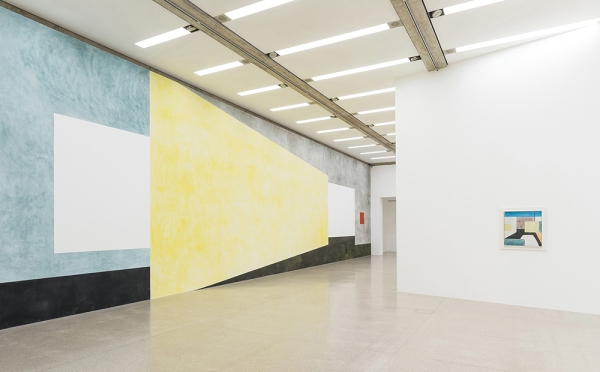What is reality, how can we believe what we see, and what are the conditions of art have been
recurring questions in Ernst Caramelle’s work since he first began exhibiting in the mid-seventies. "Art is a fake" has been
his creed ever since. In his conceptually based oeuvre that spans many different media – from drawing, painting, photography,
video, and wall painting, to virtually immaterial works with sunlight on paper – he explores the status of original and fake,
production and reproduction, the perception of art and the context of art reception.
Caramelle's paintings – whether on gesso
ground, wood, cardboard, or directly on a wall’s surface – exhibit views refracted by different perspectives. Colored, sometimes
washed-out shapes formally refer to spatial and geometrical elements, to architectural found footage. In this system of doubles,
mirror images, and juxtapositions, the wall itself is transformed into a picture. One spatial illusion follows another, while
perspective views mutate into physiognomies.
Beholding is reversed into being beheld, and what
is visible questions its own status.
Ernst Caramelle was born 1952 in Hall in Tyrol, Austria, he lives and works
in Frankfurt/Main and New York City. He studied at the Universität für Angewandte Kunst (University of Applied Arts) Vienna.
In 1974, he was a research fellow at the Massachusetts Institute of Technology, Boston. He was a guest professor at the Städelschule
in Frankfurt am Main 1981–1983, followed by a professorship at the University of Applied Arts Vienna 1986–1990. In 1994 he
became professor at the Staatliche Akademie der Bildendenden Künste (Academy of Fine Arts) in Karlsruhe, where he held the
position of rector from 2012 to 2018.
www.ortsbezogenekunst.at



